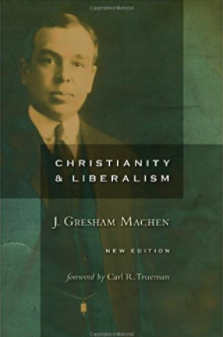Christianity and Liberalism
One of my very favorite books is Christianity and Liberalism. I have read it numerous times and am once again with the Theology for Breakfast crew.

What makes it a great book is the simplicity and clarity of the author in defending the most important matter of all—authentic Christianity. J. Gresham Machen responds to the fanciful notion that there is a Christianity that affirms what the Bible says about God, Christ, and salvation as well as a different Christianity that denies the very same things.
Machen’s argument is that authentic Christianity has always been about the supernatural reality of God reconciling sinners through the unique person and work of Christ the Lord.
So, for opposing religious leaders to promote a religion devoid of distinctives such as the actual resurrection of Jesus is to promote a religion that is altogether different and anything but Christian.
The book’s title communicates just such a reality. There is Christianity (the religion that affirms the supernatural, the virgin conception of Jesus, substitutionary atonement, resurrection, heaven, hell, etc.) and there is theological liberalism (denying what Christianity upholds). But they are not both truly Christian.
You may be thinking that all of this seems to be a “no brainer.” If so, I agree. So why write a book about it? The gospel is of first importance and apart from specific doctrines such as the bodily resurrection of Jesus, Christianity is nothing more than foolishness (see 1 Corinthians 15).
So, a book addressing the clear distinction between what is patently Christian versus what is not can be very helpful. This is the case especially when opponents of historic Christianity have made a habit of falsely using the label “Christian.”
Simply put, it becomes false advertising of the worst sort.
A related feature of the little book from 1923 that compels me to recommend it today is Machen’s insistence that the Bible is not principally a book of examples to follow.
He identifies such an approach as coming from theological liberalism where one must make some use of the Bible once it has been judged to not be about the supernatural redemptive work of God that centers upon the person and work of Christ.
Far too many Bible believers (and preachers!) have been similarly misguided in their approach to the Bible. I suspect that most do not even realize that today’s evangelicals can look an awful lot like yesterday’s gospel deniers when it comes to Bible study, interpretation, application, and preaching.
Machen’s stress on the transcendence of God and rationale for the exclusivity of Christ are a couple of other standout features, but I will avoid elaboration here.
A final feature worth mentioning is the dedication. The dedication page of Christianity and Liberalism is three simple words beautifully constructed.
It reads, “To My Mother.” With Mother’s Day this month, mothers can be encouraged to point sons and daughters to Christ. And moms or not, we can all be thankful that John Gresham’s mother Minnie pointed her son to Christ.
More in Monthly Newsletter
May 1, 2024
The Christian Ethic of Joy and SufferingMay 1, 2024
Elders ReportMay 1, 2024
Deacons Report